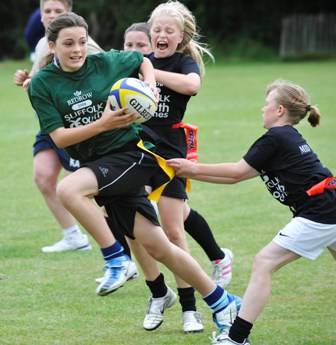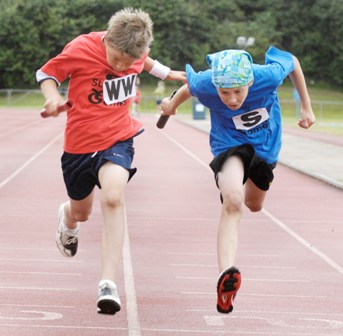
Managing competition: simple in principle
Competition managers: unravelling the myths
While the existence of the competition manager confuses some and irritates others, Ian Jackson reckons the role is pure sports development in action.

Managing competition: simple in principle
Think back to that time in the playground at primary school when you took a leather football full-on in the face on the coldest day of winter. You felt like your head was going to implode and you wanted nothing other than to cry for your mum, but you didn’t because you felt too proud. When I took on the role of senior competition manager for Suffolk back in April I spent the first few weeks feeling like that. Friends and family would ask how the new job was going and I would nod incessantly, breaking into what almost resembled a grin before unconvincingly mumbling something along the lines of, “Yeah, it’s good, thanks.” It was at that point I would fear the follow up question: “So what exactly is your role?”
It’s not that I had no comprehension of my new job, you understand. After all, I had read the person specification and job description like all of the unsuccessful candidates. It was more about the fact that I didn’t have a clue where to start.
The principle of the competition manager is a simple one and that’s probably why it provokes a degree of distrust and apprehension among traditional sports development partners. It is a predominantly strategic role aimed at facilitating an increase in the number of young people participating in high-quality, inter-school competitive sport.
On hearing that explanation the bemused outsider looking in can often be heard thinking ‘Is that it?’ And you might believe justifiably so until, that is, you scratch beneath the surface. Because, as contentious as it may sound, this is pure sports development.
The work of the network of competition managers in each county is based on sound planning as a consequence of direct consultation with the varied range of partners responsible for delivering and administering school and community sport. Consequently, the list of partners includes school sport partnerships, local authorities, sports clubs, extended schools officers, national governing bodies, county sports partnerships, school sport associations, community sports coaches and facility providers. When you consider that the aim is to bring all of these agencies and individuals closer together in an effort to not only increase participation in competitive sport but also to enhance the quality of experience for those involved, I hope you can see that we’ve got our work cut out.
Every county in England now has a number of competition managers roughly equating to one for every two school sport partnerships, approximately 225 in total. Our positions are financed through a combination of funding from the Department for Culture, Media and Sport (DCMS) and the Department for Children, Families and Schools (DCFS) with direct administration and support from the Youth Sport Trust. Competition managers are an integral part of the school sport partnerships and have confirmed funding until 31 March 2011. Between now and then we have been tasked with increasing the number of young people engaged in high-quality, inter-school sport competitions by 5% year on year.
In an effort to meet what are quite demanding targets, a lot of the intervening period will be spent educating, influencing and negotiating.
Educating the educationalists will be a challenge, but ultimately rewarding. By their own admission, partnership development managers have spent a lot of their time focusing on ensuring that all young people are given access to two hours of quality PE per week and their success has been well documented. However, if the new target of five hours is to be achieved there will need to be an injection of community sport into the school environment and that is where the competition managers come in. Due to the fragile relationship between government funding and sport, we must be constantly mindful that any activity stimulated should be ultimately sustainable. Good-quality community sports clubs are the one constant in any given area and when introducing competitive opportunities we need to utilise their coaches, administrators and facilities where at all possible. In return we can tap into leadership programmes developed by the national governing bodies and provide confident, conscientious young people capable of assisting with the delivery of the competitions and blossoming into the club coaches of tomorrow. Furthermore, this simple but effective basic premise of sports development should result in a flow of young people into sports clubs and ultimately lead to an improvement in standards, thereby aiding and assisting in talent identification and development.
The employment of influencing and negotiating skills will most obviously reap benefits when properly applied to the numerous volunteer bodies associated with the organisation of competitive school sport. Many school sport associations are administered by overstretched and undervalued committees of sports-mad enthusiasts who have been doing the job since schools were first established as a concept, let alone sports. We need to help alleviate their burden and work with them to better co-ordinate the provision of inter-school competitive sport. The challenge lies in not letting them believe that we are merely in existence to administer a culling programme and take on their roles. We need more volunteers, not less.
At the centre of this drive to increase the competitive edge of the nation and improve standards in school sport and beyond is the Youth Sport Trust (YST). With a plethora of sporting patrons and the cash to back up its ambitions, the YST has arguably become the lead sports development agency in England and that ambition is only just being realised. Capitalising on the awarding of the Olympic and Paralympic Games to London in 2012, the YST has implemented the National School Sport Week and the UK School Games. The latter is a multi-sport event for the UK’s elite young athletes of school age, which this year was held in Bath and Bristol at the end of August. Nine sports are represented and the intention is to assist in both the promotion of these sports and the opportunities available to young people to compete at an event which has the feel of a major tournament. National School Sport Week is intended to promote the positive benefits of sport and bring such benefits to the attention of the nation’s media. Schools will once again be encouraged to stage and become engaged in competitive sport for one week at the beginning of July 2009.
That is pretty much the role of a competition manager, and the reasons for our existence, in a nutshell. We’re not here to reinvent the wheel and we’ve got nothing on sliced bread. All we’re trying to do is co-ordinate the efforts of a multitude of agencies and individuals engaged in the delivery of sporting opportunities throughout every county. We are messengers with a simple message: “Sport is good; now get out there and enjoy it.” It’s sport for sport’s sake and it’s here to stay. At least until late September 2012…
Ian Jackson is Suffolk’s senior competition manager
The views expressed in this article are those of the individual and do not necessarily represent the views of the Youth Sport Trust or Suffolk County Council
The Leisure Review, September 2008
© Copyright of all material on this site is retained by The Leisure Review or the individual contributors where stated. Contact The Leisure Review for details.
